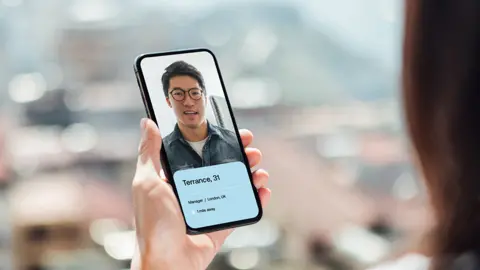Romance fraud: 'I wish I hadn't given £300k to a man I met online'
 Getty Images
Getty ImagesNames in this article have been changed to protect identities.
In May 2019, Sophia* started speaking to Aaron* on a dating site.
She was looking to settle down and marry. Aaron said he was too. They talked more, and things started moving quickly.
Sophia didn't expect to find that later down the line, she would be left with no partner and £300,000 in debt, after giving cash to the man she'd met.
She's been speaking to BBC Asian Network, and says she was a victim of "romance fraud", and wants dating apps to take more steps to prevent it.
'False mortgage documents'
Sophia, and the man she thought was her partner, started speaking about buying a house together - without ever meeting in real life.
Looking back, Sophia feels she was told "many lies" about their future.
She says he created false mortgage documents and emails to solicitors. He was selling her a dream, and she was buying it - literally.
Sophia sent Aaron huge amounts of money he asked for as part of their future plans to buy a house.
"I took out thousands in loans and my entire savings, which equals around £50,000-60,000.
"Then I borrowed lots of money from family and friends."
In total, Sophia says she sent him around £300,000.
 Getty Images
Getty ImagesShe's not the only one to fall for romance fraud. According to UK Finance, there was a 20% increase in bank transfer fraud linked to romance scams between 2019 and 2020.
When he asked for a further £50,000, Sophia decided it was time to question things.
She called her bank, where she believed she had a shared account with Aaron. They told her that her name was not on the account.
"I felt like the ground had opened up beneath me. I could not believe it. I felt like I was in a very bad dream," she says.
"You see stories, you read stories, you hear about other people's stories, but you feel like that's never going to happen to you.
"But it did, because of the emotional abuse that you don't realise you're under."
'Put down the phone and call the police'
Sophia started to investigate her supposed partner, and find out if he worked where he said he did.
"They said nobody of that name works here.
"It was actually the guy who works at Barclays who said, 'you need to put the phone down and call the police right away'."
And she did. Thames Valley Police told the BBC it is investigating an allegation of romance fraud, which was reported to the force via an Action Fraud referral in January 2020.
No arrests have currently been made, but the investigation is ongoing. It did not confirm nor deny names or identities of either suspects or victims in the case.
Two years on, Sophia feels that she is in a much better position.
A recent review by the financial ombudsman ruled in her favour. This means that under the Contingent Reimbursement Model [CRM] Sophia was a victim of something called an authorised push scam, therefore the banks should legally give her her money back.
The process of reclaiming her cash back from the banks was not easy for Sophia.
"They were very quick to dismiss me and put me off and say 'nope this is not fraud, you knew this person'.
While Sophia was eventually reimbursed by the other banks, Nationwide Building Society was the only one not to refund the money straight away.
Nationwide told the BBC: "Our original assessment at the time of the member's claim was that this was a civil matter between parties.
"As a result of the case going to the ombudsman and clarity emerging about the advanced nature of the scam, we fully accept the recommendation to ensure the member is fully reimbursed, along with compensatory interest, and apologise if we have, in part, led to any additional distress."
'Emotional trauma'
Throughout the process, Sophia was struggling mentally.
"I had to take a week off emergency leave because my head was all over the place... the emotional trauma and the pain I felt seeing in my family's eyes."
Now, Sophia is just glad to be out of that stressful period.
"My debts are paid off, all my loans are paid, all my family and friends back.
"I'm short of a little bit of money, but now I can move on with my life."
But she doesn't want her story to be in vain. She wants more people to be aware of the dangers of trusting those on dating apps.
"There is no confirmation. No CRB check has been given in, no employee check has been done."
She also hopes others who might get in to a similar situation know their rights when it comes to challenging banks.

Advice suggests:
- Online daters should not send any money, allow the other person to access their bank account, transfer money or take out a loan on the other person's behalf
- You shouldn't hand over copies of personal documents such as their passport or driving licence
- Don't invest money on the other person's advice
- Don't receive or send parcels on the other person's behalf
- Perform a reverse image search on a search engine to see if person is using fake photos
- Contact your bank immediately if you think you have fallen for a scam and report it to a cyber crime charity such as Action Fraud
- For more advice on debt, go to BBC Action Line


